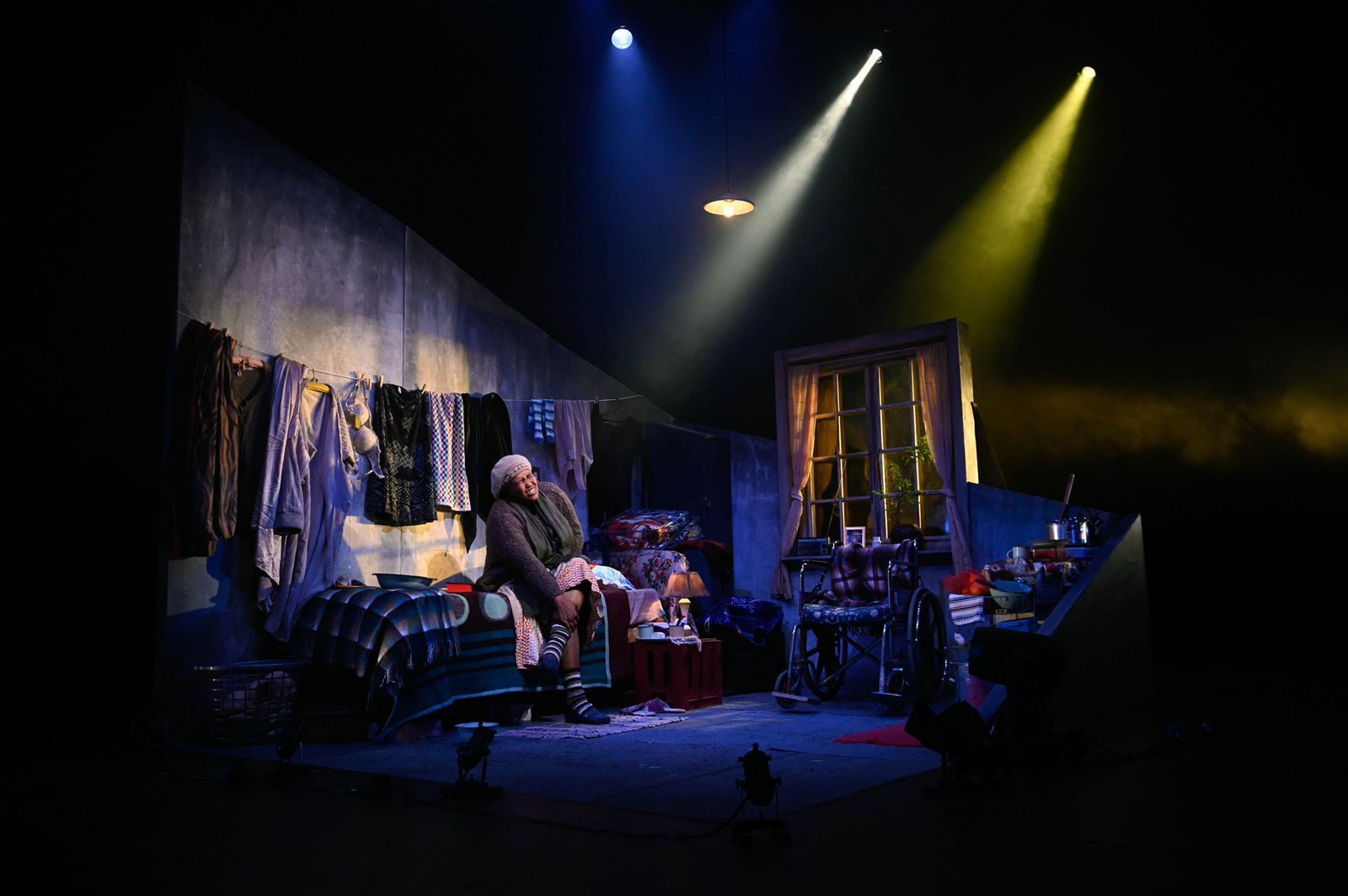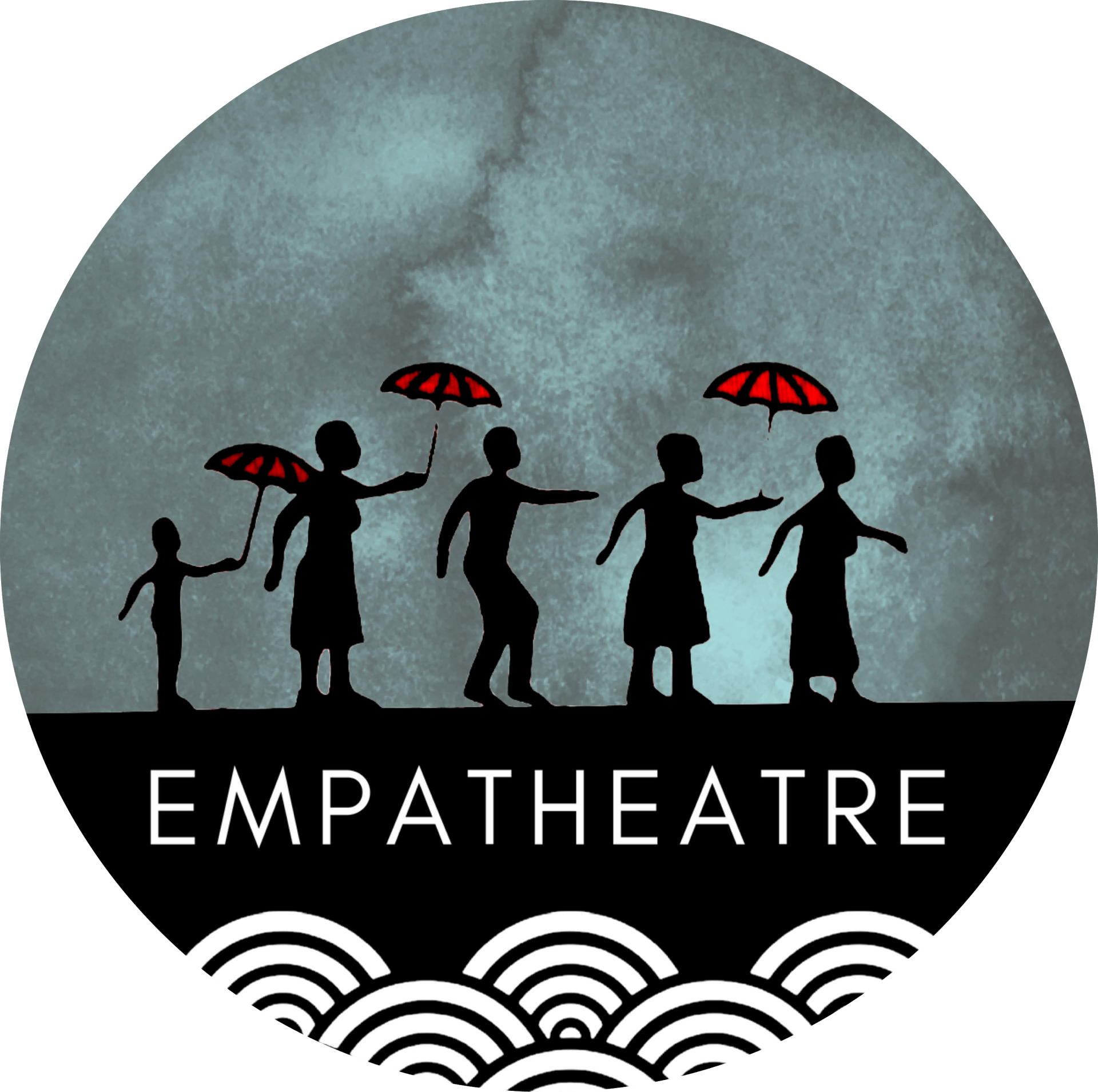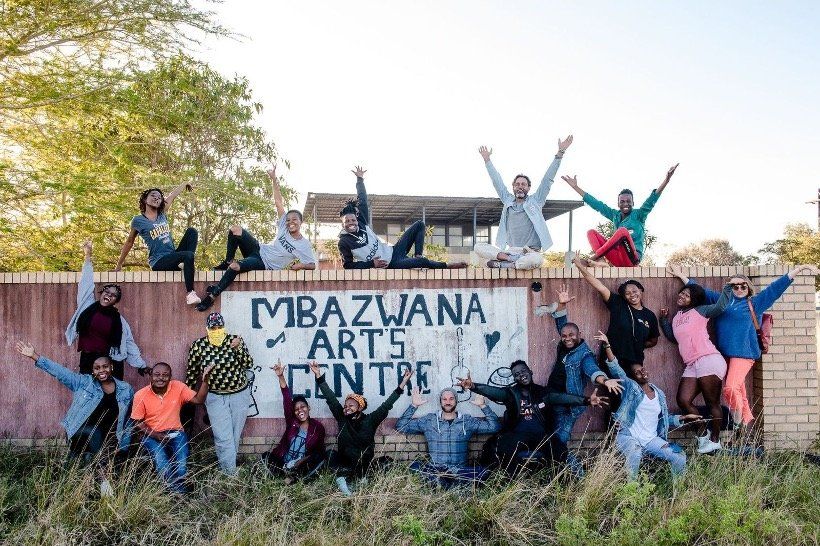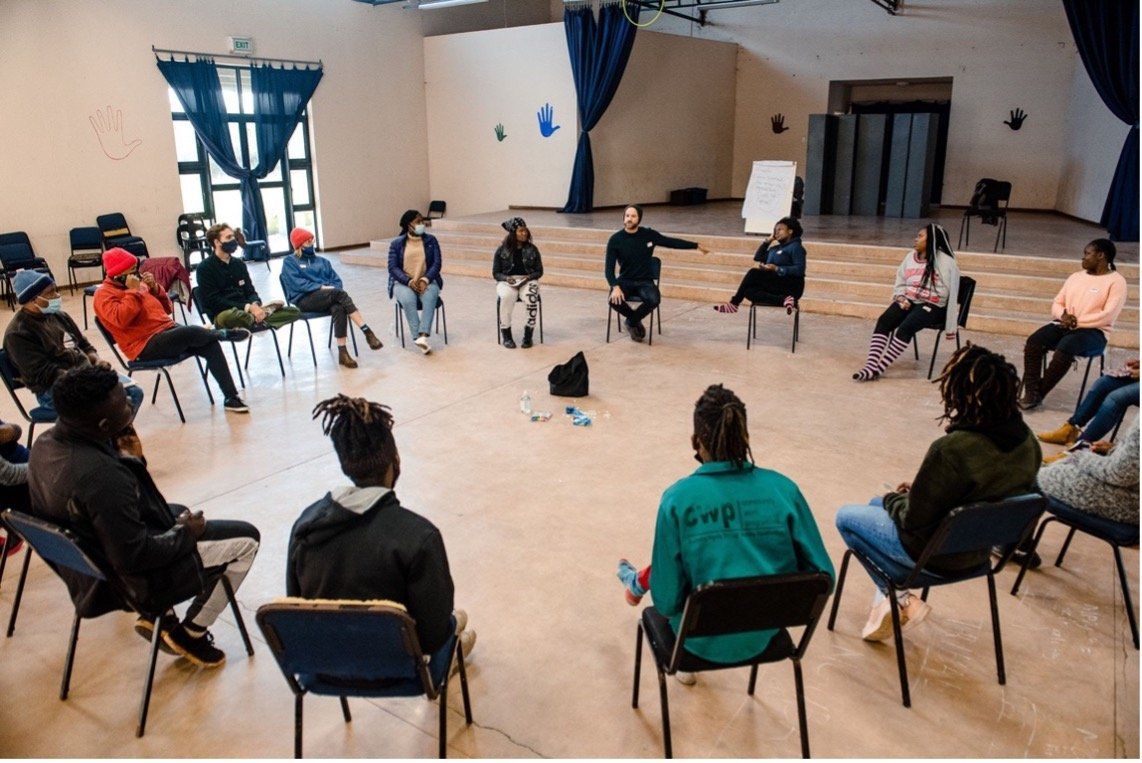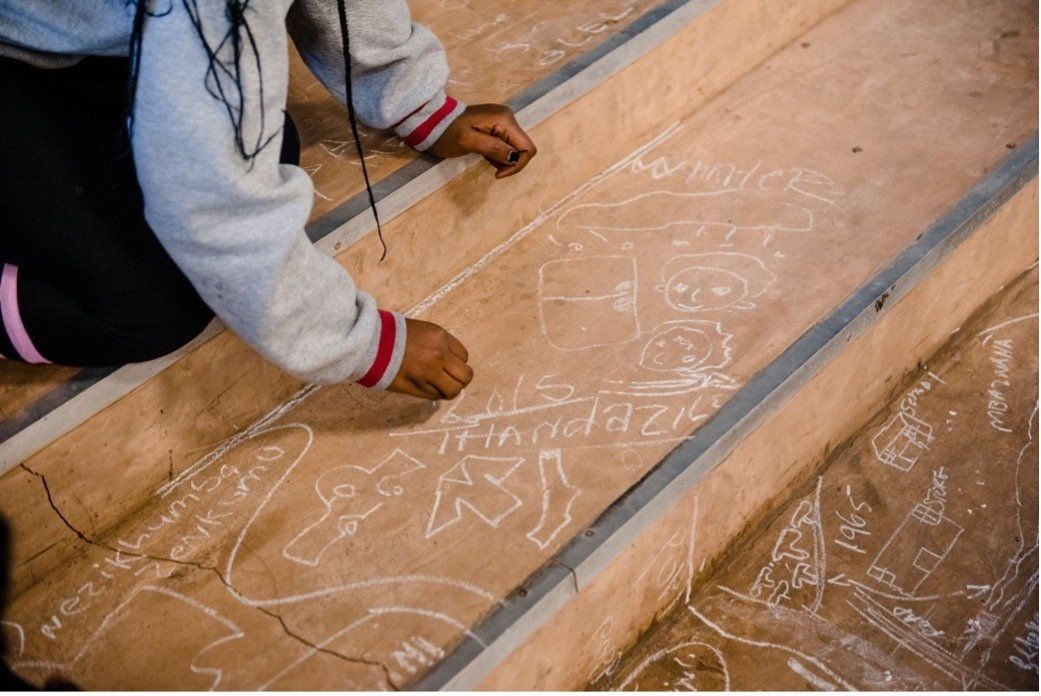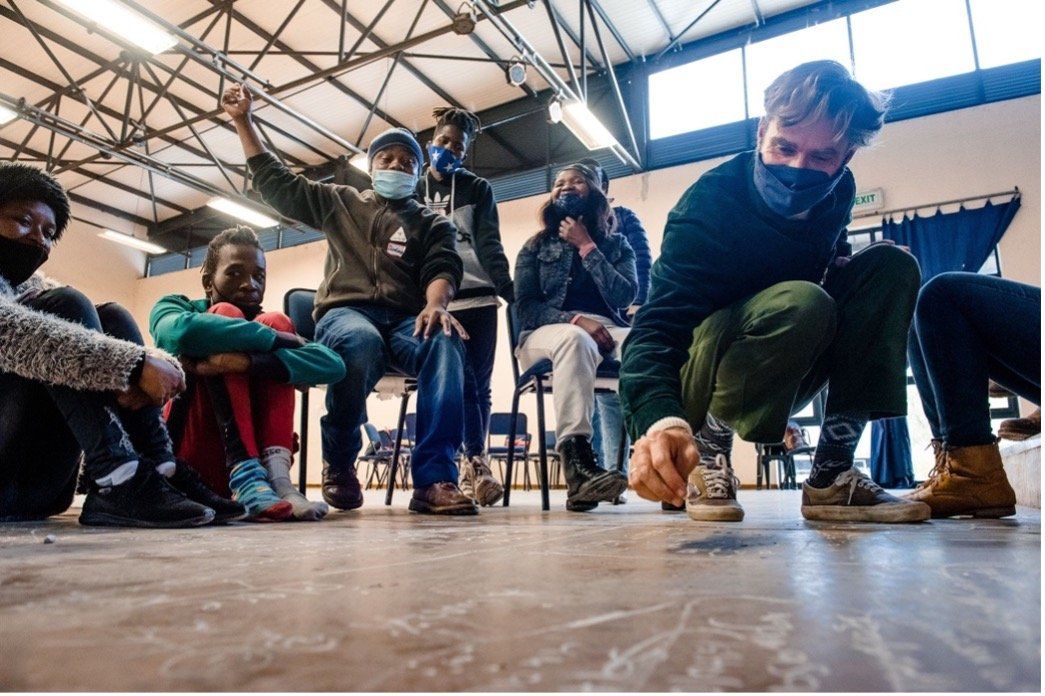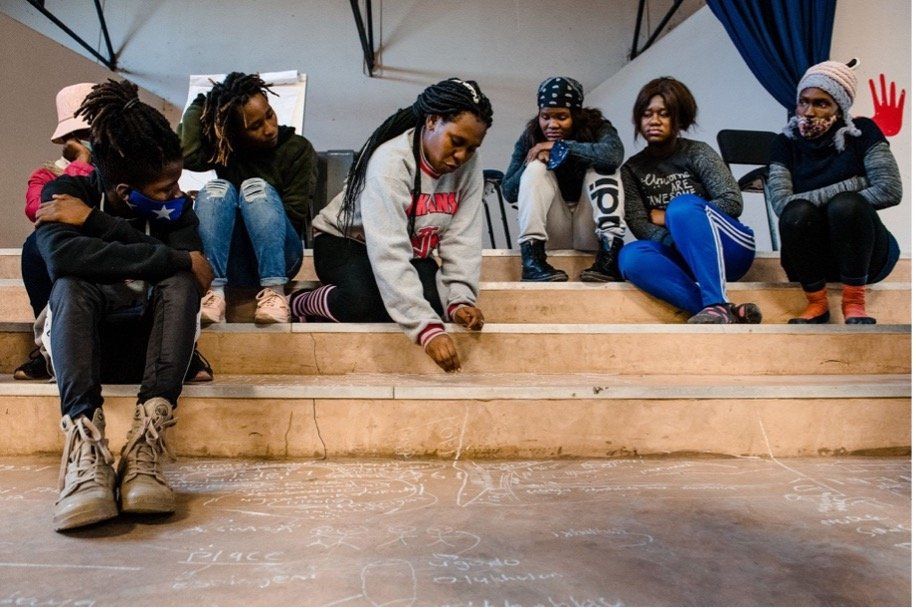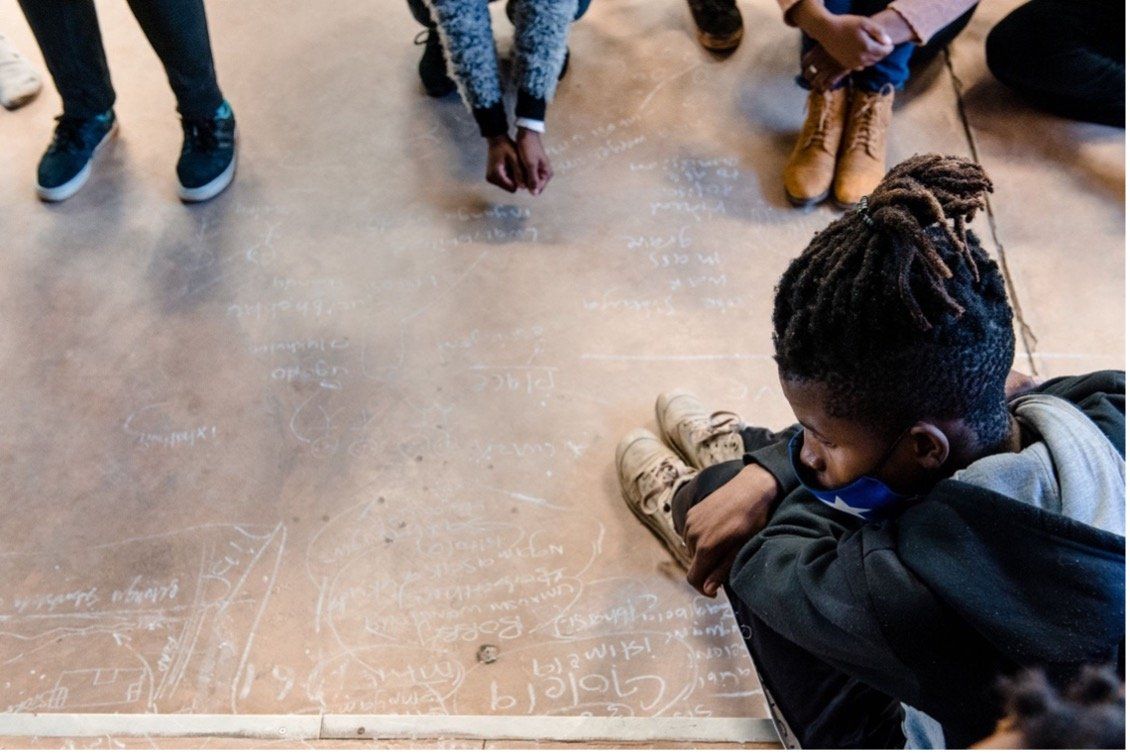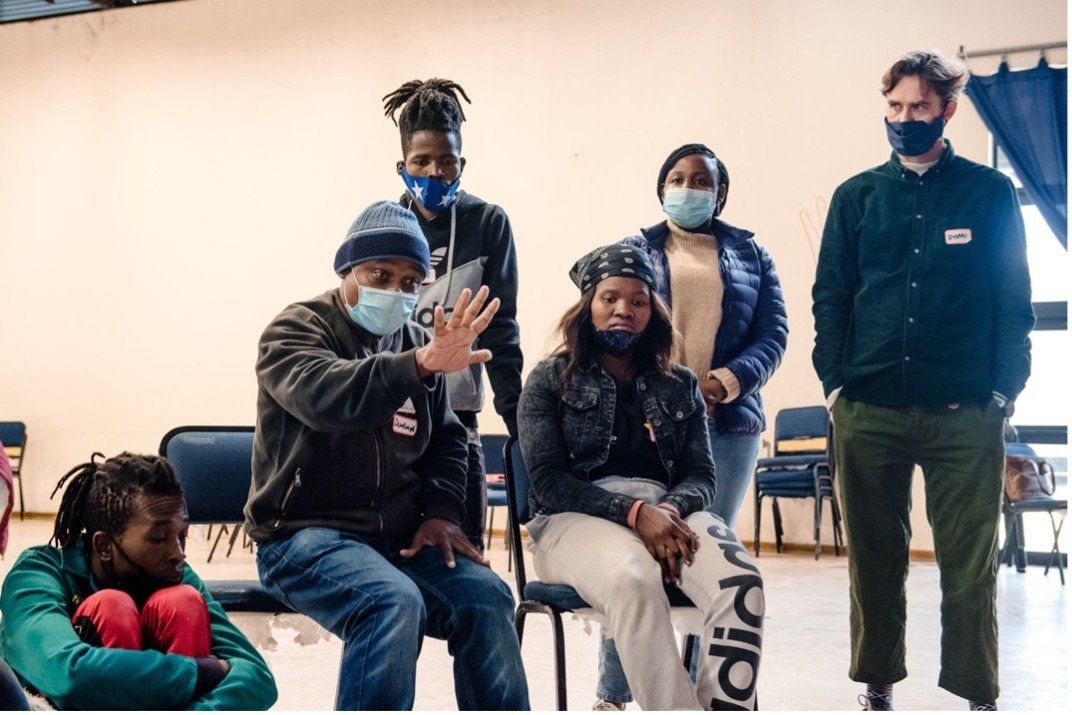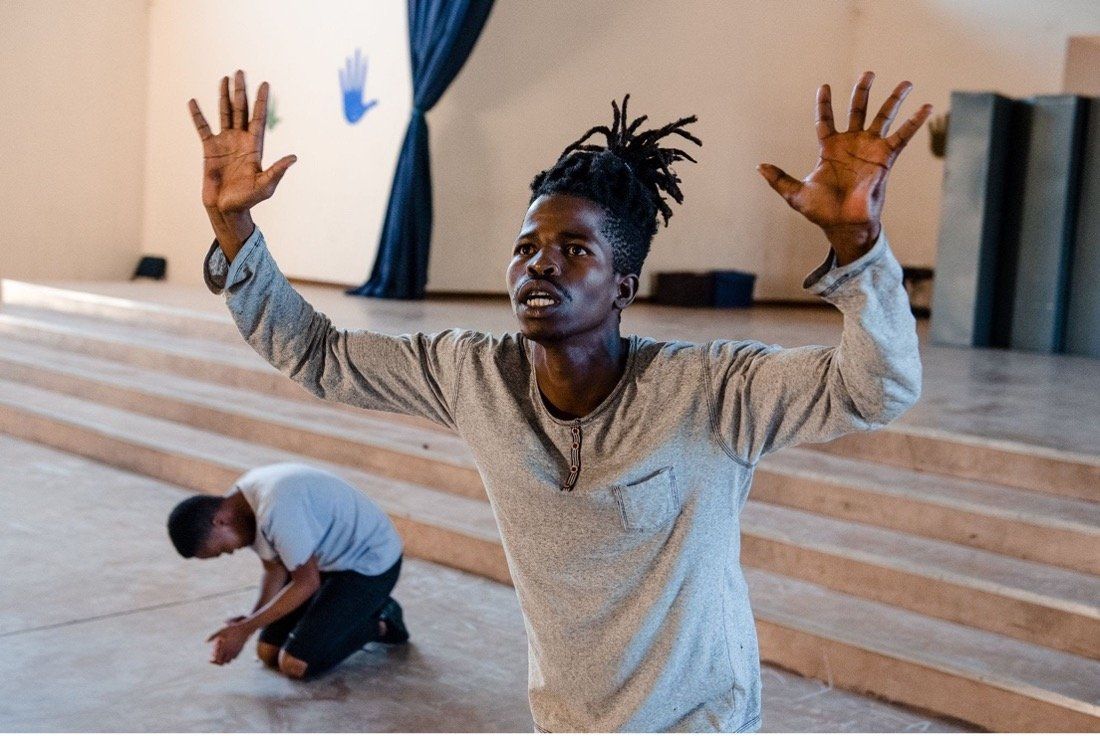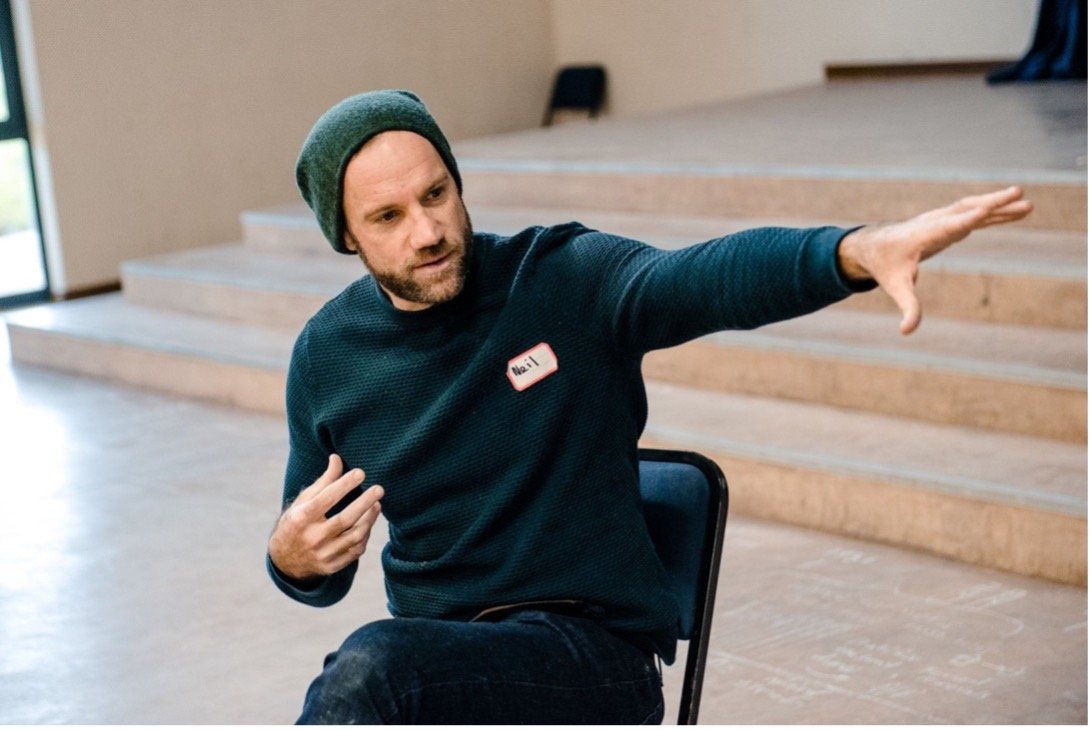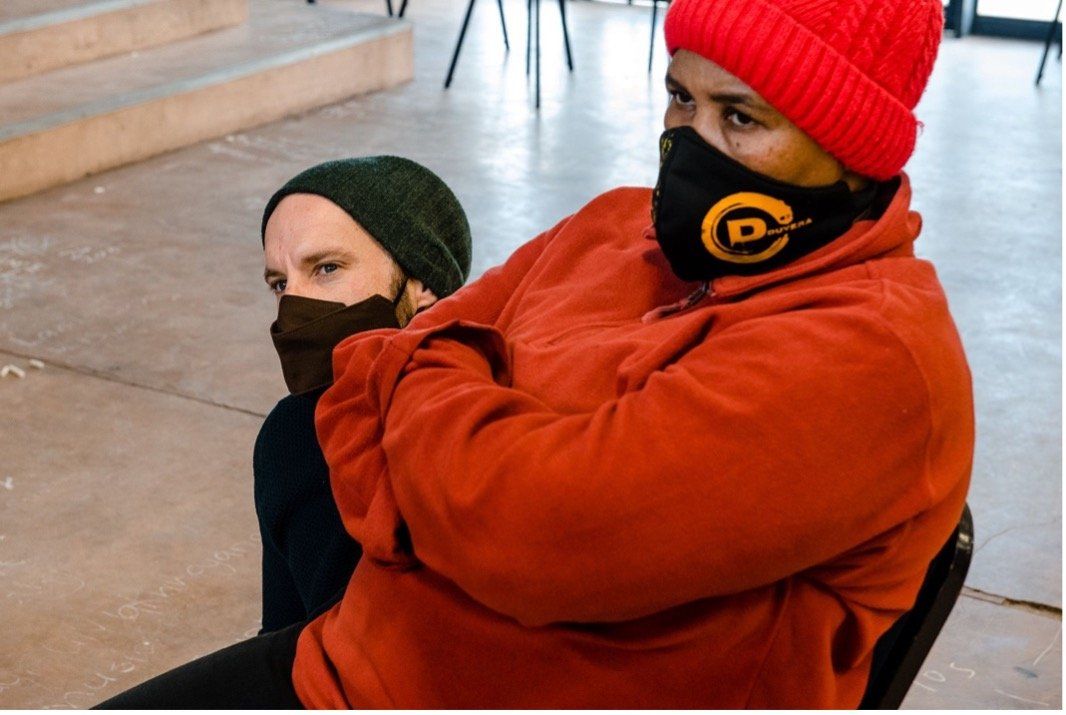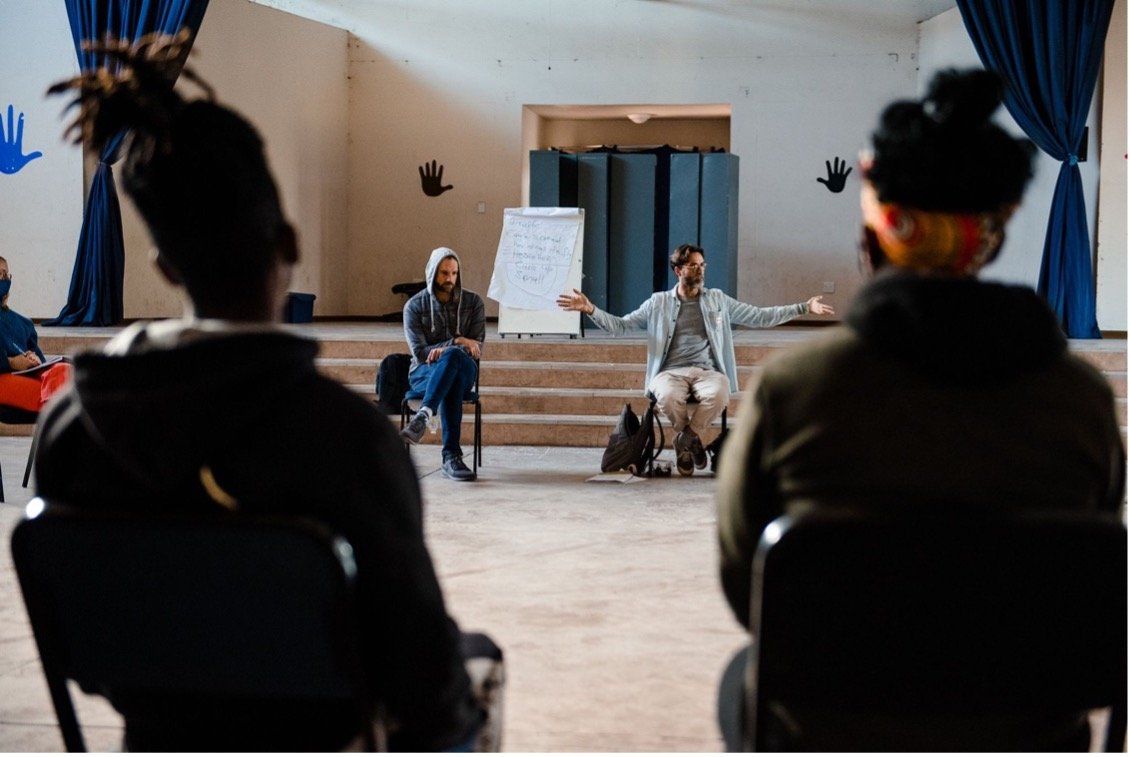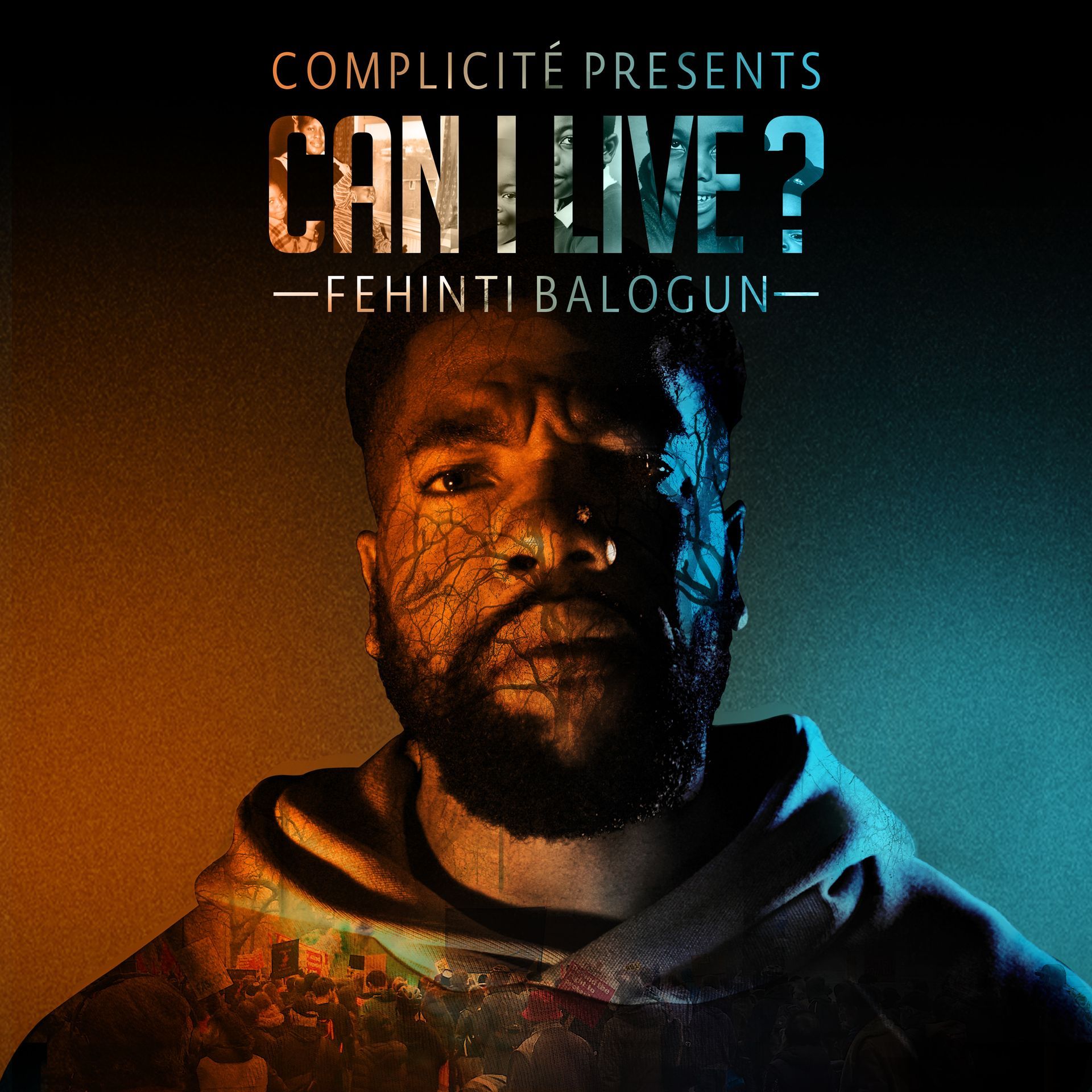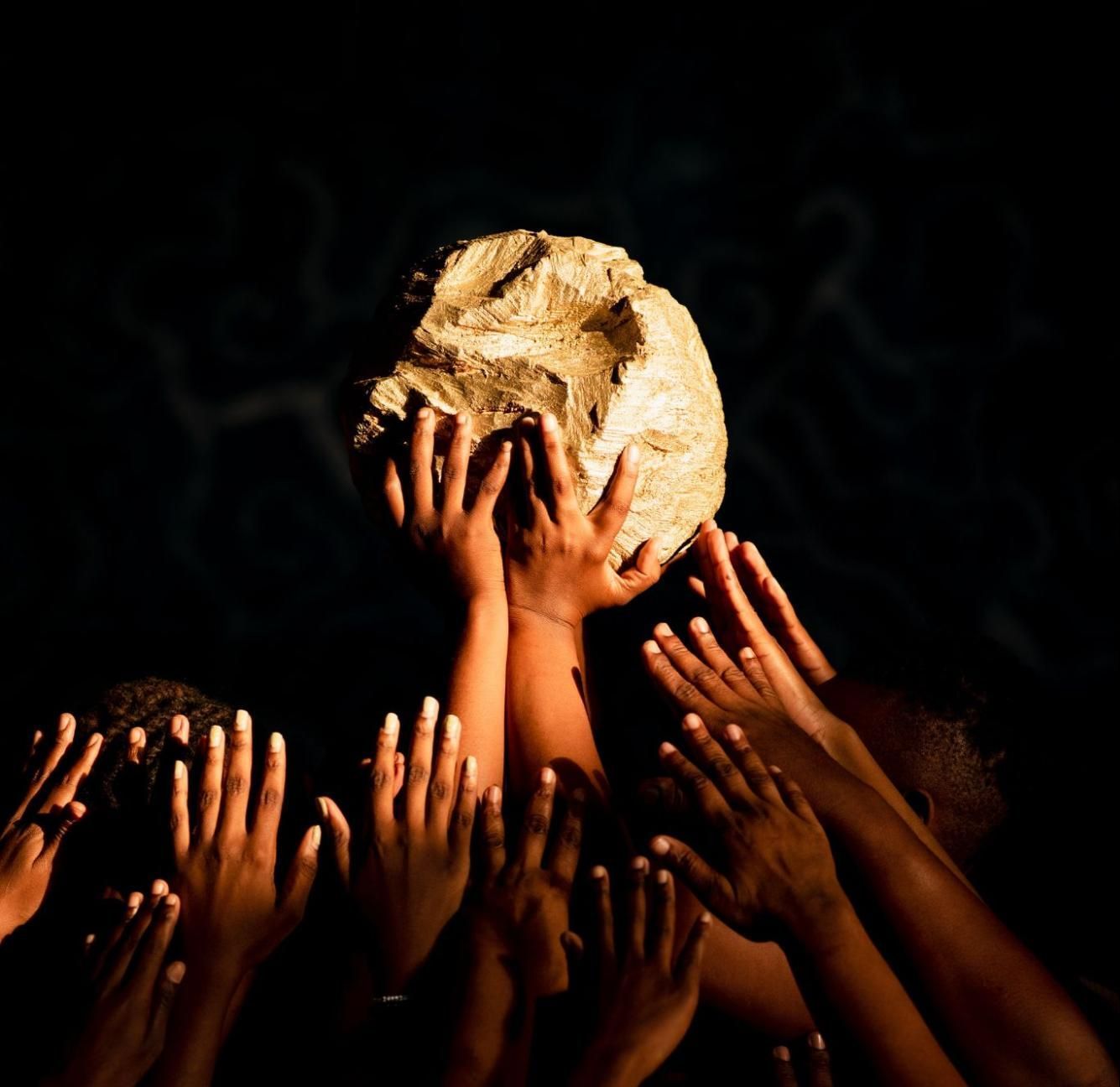Amagagasi/Tides - Tracking the tides of history and re-imagining futures in Northern Zululand.
A Mbazwana Creative Arts (MCA) & Empatheatre collaborative storytelling project.
The Empatheatre team and participants from the Mbazwana Creative Arts collective after their first week of workshops together outside the Mbazwana Arts Centre, Zululand. 2021. Pic By Jacki Bruniquel
The Empatheatre team and participants from the Mbazwana Creative Arts collective brainstorm new ideas as the Mbazwana Arts Centre Workshops in Zululand. Pic By Jacki Bruniquel
The participative research and theatre-making/touring component of the Amagagasi project aims to foster a new public dialogue and alternative approach to spatial planning of rural areas surrounding conservation and mining concessions. One in which traditional knowledge, contemporary social dynamics and cultural phenomena are foregrounded in these decision-making processes.
The Amagagasi project will work with concurrent practices and outcomes, on the one side there is the creation of a powerful piece of street-theatre in which audience members participate in a ‘call and response’ storytelling process that re-maps (in vernacular isiZulu) the land/and coastline, creating an “alternate archive” that re-tells the story of the region from local people’s perspective, and then explores, alongside the public, the potential of devising a new map of the region.
The project received its initial research scoping funding from the One Ocean Hub (OOH) and through the South African National Biodiversity Institute’s (SANBI)’s African Coelacanth Ecosystem Programme (NRF-ACEP) funded Deep Connections Project, all of which committed pilot funding for our preliminary start-up workshops. The project forms part of a greater initiative spearheaded by OOH, and SANBI’s NRF-ACEP funded deep connections project to enrich and deepen our understanding of marine ecosystems and the relationship people have with them. The first workshop took place in June of this year whereby The Empatheatre facilitators used chalk drawings on the hall floor to map the KZN coastline and asked participants to locate where they were born and narrate an early childhood memory pertaining to it.
Noxo Mlungwana fills in a story on the chalk time-line. The time line featured narratives, anecdotes, stories, myths, events and historic episodes that participants felt impacted the Mbazwana region and their own lives. Mbazwana Arts Centre, Zululand, 2021. Pic By Jacki Bruniquel.
Gradually the cement floor of the arts-centre hall came alive in white chalk lines and illustrations telling a myriad of stories...stories that introduced us to rivers, coastlines, homesteads, lakes, plantations, cattle, horses, hippos, and magical snakes and baboons of the area. Participants then also shared their first memories of the sea, while standing on the map to illustrate where they first encountered it. Over the next few hours the group travelled up and down this mapped coastline listening to participants telling a series of stories and personal recollections around the Sodwana Bay area.
Another exciting generative exercise was the drawing of a chalk time-line across the expanse of the arts centre floor and asking participants to pick up a piece of chalk and fill in the time-line with narratives, anecdotes, stories, myths, events and historic episodes that they personally felt impacted the Mbazwana region and their own lives. This allows for the team and participants to place stories and histories against landmarks and places, but also weave together their memories of the region with each other’s.
Participants were also encouraged to return back to their communities, in-between these sessions, to interview their elders about other stories of the land and sea… stories which were later written (or drawn) into the time-line and narrated back to the rest of the group.
This time line spanned 15m and over the next few days would leap to vivid illustrated life with drawings and isiZulu key words written along it, these were place-holders and land(time) marks for us to return to – walking along the timeline felt like walking as a group across the coastline, and each story felt like the tide rushing up to meet us. All of these tidal shifts revealed layer upon layer of fascinating stories and histories of the region from the beginning of time (mythical and remembered)……. right through to the present day moment. Once again the group moved along this time-line listening to each participant narrate (and even re-enact) their contributions.
Empatheatre co-facilitator Dylan McGarry helping keep the chalk time-line up to date. Mbazwana Arts Centre, Zululand. 2021. Pic By Jacki Bruniquel.
After surfacing a range of narratives through these mapping exercises-- combined with a variety of participative theatre and writing-games and exercises which were conducted by Empatheatre facilitators—on the closing day, participants were divided into groups and asked to theatricalize and perform a story which had resonated with them the most over the last few days of storytelling, sharing and listening.
One of the most profound moments in the workshop was witnessing Dr. Philile Mbata from the One Ocean Hub engage with and participate in the timeline process. Dr. Mbata who is based at the Department or Environmental and Geographical studies at UCT, had conducted her PHD over a decade prior in the region and worked with indigenous knowledge holders, many of whom would have been the grandparents of the participants, and had subsequently passed on. As an isiZulu speaker from Umlazi, she has been carrying stories and histories gifted to her, and finally had a chance to share many of them back with the participants. It’s a rare moment when academic work comes back to a community in the language of the place and that can be fully held and used by the next generation who the stories rightfully belong.
At the close of this workshop, a shared project WhatsApp Group was created and participants have been provided with a data allowance from June to November 2021(Courtesy of NRF-ACEP) to continue interviewing and sharing stories centring around the research questions/collective interests which were decided upon over the course of the first meeting.
Over the last two months the WhatsApp group has already generated a wealth of incredible interviews with local fisherfolk, sangomas and elders from Mbazwana and continues to surface powerful narratives, mythologies and belief-systems pertaining to the region. All dialogue, sharing of stories, and collaborative analyses of the stories are occurring in vernacular isiZulu, Empatheatre feels strongly that every stage of the research and devising of a new project should occur in the main language of the region, and we have been very inspired by the rich idiomatic and poetic framing and shaping of stories that is emerging in northern Zululand dialects.
We are currently fund raising and preparing for a series of follow up workshops that will work to transform these insights and oral histories into a thrilling hour-long theatrical production which will tour the Mbazwana/ Sodwana bay region for a week in July next year.
The chalk time-line spanned 15m and over the course of our workshops lept to vivid illustrated life with drawings and isiZulu key words written along it, these were used as place-holders and land(time) marks for us to return to. Mbazwana Arts Centre, Zululand, 2021. Pic By Jacki Bruniquel.
The chalk time-line spanned 15m and over the course of our workshops lept to vivid illustrated life with drawings and isiZulu key words written along it, these were used as place-holders and land(time) marks for us to return to. Mbazwana Arts Centre, Zululand, 2021. Pic By Jacki Bruniquel.
“Walking along the timeline felt like walking as a group across the coastline, and each story felt like the tide rushing up to meet us. All of these tidal shifts revealed layer upon layer of fascinating stories and histories of the region from the beginning of time (mythical and remembered)……. right through to the present day moment.” Reflects Dr. Dylan McGarry Mbazwana Arts Centre, Zululand, 2021. Pic By Jacki Bruniquel.
On the closing day of the workshops, participants were divided into groups and asked to theatricalize and perform a story which had resonated with them the most over the last few days of storytelling, sharing and listening. Mbazwana Arts Centre, Zululand, 2021. Pic By Jacki Bruniquel.
Empatheatre co-facilitator Neil Coppen talking participants through a writing exercise. Mbazwana Arts Centre, Zululand. 2021. Pic By Jacki Bruniquel.
Empatheatre co-facilitators Neil Coppen and Dylan McGarry. .Mbazwana Arts Centre, Zululand. 2021. Pic By Jacki Bruniquel.
